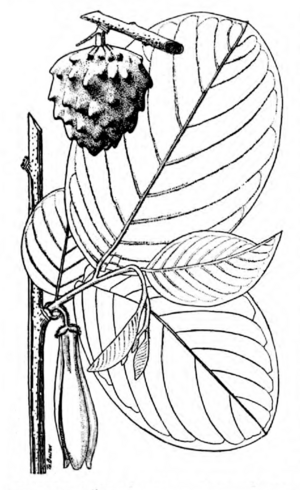Annona longiflora facts for kids
Quick facts for kids Annona longiflora |
|
|---|---|
 |
|
| Botanical illustration of Annona longiflora | |
| Scientific classification |
|
| Genus: | Magnoliophyta |
| Genus: | Magnoliopsida |
| Genus: | Magnoliales |
| Genus: | Annonaceae |
| Genus: | Annona |
| Species: |
A. longiflora
|
| Binomial name | |
| Annona longiflora S.Watson
|
|
| Script error: The function "autoWithCaption" does not exist. | |
Script error: No such module "Check for conflicting parameters".
Annona longiflora is a type of plant that belongs to the Annonaceae family. It is found only in Mexico, meaning it is endemic there. An American botanist named Sereno Watson was the first to officially describe this plant. He named it longiflora because of its long flowers; longus means "long" in Latin.
About the Plant
Annona longiflora is a bush that can grow up to about 0.9 meters (or 3 feet) tall.
- Its leaves are usually between 5.1 and 10.2 centimeters (2 to 4 inches) long. They have a pointed tip.
- The top of the leaves is almost smooth, but the bottom has soft, short hairs.
- The plant has small, triangular or oval sepals, which are about 5.6 millimeters long.
- Its outer petals are oblong and about 5.1 centimeters (2 inches) long. These petals are white with a black part at their base. They are curved outwards at the bottom and smooth on the inside.
- The inner petals of the flower are very small or almost missing.
- The fruit of Annona longiflora is shaped like a globe or an oval. It is about 3.8 centimeters (1.5 inches) long and has a net-like pattern on its surface.
- The seeds inside the fruit are smooth and shiny.
How it Reproduces
The pollen of Annona longiflora stays together in groups of four, which is a special way for this plant to spread its pollen.
Where it Lives
This plant grows in ravines, which are narrow valleys with steep sides.
What it is Used For
In Mexico, Annona longiflora is used as a native edible fruit. People eat it even though it is not grown on farms. Scientists have found pictures of Annona longiflora on old ceramic jars from 100 to 400 C.E. This suggests that the fruit was an important part of food systems a very long time ago.
 | Chris Smalls |
 | Fred Hampton |
 | Ralph Abernathy |

